 Steven L. Peck was honored with the 2021 Smith-Pettit Foundation Award for Outstanding Contribution to Mormon Letters. The award was presented on June 5 as part of the Association for Mormon Letters Virtual Conference, where the award citation was read and a panel of Peck experts (Kylie Turley, Mattathias Westwood, Rosalynde Welsh, and George Handley) convened to discuss his literary accomplishments. You can watch a recording of the panel here. Below is the award citation, followed by a brief review of Steve’s career up to this point. Thank you to the Smith-Pettit Foundation for providing funding for this award.
Steven L. Peck was honored with the 2021 Smith-Pettit Foundation Award for Outstanding Contribution to Mormon Letters. The award was presented on June 5 as part of the Association for Mormon Letters Virtual Conference, where the award citation was read and a panel of Peck experts (Kylie Turley, Mattathias Westwood, Rosalynde Welsh, and George Handley) convened to discuss his literary accomplishments. You can watch a recording of the panel here. Below is the award citation, followed by a brief review of Steve’s career up to this point. Thank you to the Smith-Pettit Foundation for providing funding for this award.
Award citation
In 2001, a mild-mannered Latter-day Saint entomologist named Steven L. Peck experienced a bout of madness. Driven into an alternate reality, he saw lights, fanciful animals, people who did not exist, and threatening, evil visitors. He was stranded in a world no one else could see and, disturbingly, it was a world in which God was unreachable. Peck was still himself, and he wrestled with how to fulfill his moral obligations to those he loved. Yet his world spiraled out of his control, and it seemed that nothing– not his own best efforts, not his wife’s pleadings, not the ministrations of local doctors and nurses—could release him.
Then it ended. A microscopic intruder, burkholderia pseudomallei, was the cause of Peck’s entire ordeal, and a massive dose of antibiotics brought him back. But back to where and from where? Peck had vivid memories of experiences everyone else insisted did not happen. His mind understood that a bit of bacteria from southeast Asia caused a brain infection and that in turn created a demon-filled, Walmart-of-a-world, yet it felt real. This encounter produced a secondary crisis: how could he trust any of his sensations after all his senses had been deceived?
The easiest solution would have been denial. After managing to navigate back to reality, many would have pretended that the shifting sea of (un)certainties never seemed real. Yet Peck had not only contemplated a god-forsaken darkness, he had seen, heard, smelled, tasted, and touched it; he lived in it and wrestled himself and his mind back out of it. Intrigued by his own experience, he used it to forge a new epistemology, translating his bacterially-induced crisis into literary alchemy.
In the past twenty years, he has produced four novels, two anthologies of short fiction, a poetry collection and a plethora of uncollected poems. He has also written an academic memoir, a theological treatise, and untold numbers of other genre-stretching texts, alongside his ground-breaking academic studies. Attributing Peck’s explosive productivity to the interference of one bacterium is reductive and belies Peck’s own inventive gifts. And yet, each word he writes, each relationship and connection he thematizes is a thrice-blessed miracle: they are authored by someone who should not be alive or at least should not be sane. Not only is Peck very much alive and sane, he recovered with his brilliant mind intact, full of words and full of ideas. Readers will not find the bland writings of someone escaping from life in Peck’s works. On the contrary, Peck engages in his fictitious and his real worlds with a sense of profound wonder at the beautiful and bizarre, seeming awestruck by the intertwining of all life-forms.
 At a time when a crisis of credibility is tearing apart LDS community, when non-belief or difference in belief is causing Babel-like fractures, Peck offers us odd medicines. Peck’s first and most popular book, A Short Stay in Hell (2009, republished by Strange Violins, 2012) invites faithful LDS readers to imagine how they would confront a humorous and hellish unending library/afterlife, rather than their expected celestial glory. What does faith mean in such a place?
At a time when a crisis of credibility is tearing apart LDS community, when non-belief or difference in belief is causing Babel-like fractures, Peck offers us odd medicines. Peck’s first and most popular book, A Short Stay in Hell (2009, republished by Strange Violins, 2012) invites faithful LDS readers to imagine how they would confront a humorous and hellish unending library/afterlife, rather than their expected celestial glory. What does faith mean in such a place?
In Gilda Trillim: Shepherdess of Rats (Roundfire Books, 2017) Peck risks his readers’ revulsion and disgust. Perhaps only someone who has faced his own worst fears can write such fearless words, asking his readers to see salvation in the willing sacrifice of human flesh, to find grace in rats and God.
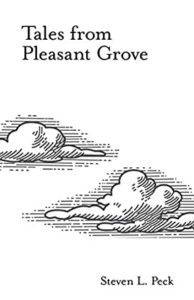 Tales of Pleasant Grove (2018) offers a radical defamiliarization of the land we think of as our own backyards, allowing us to acknowledge the magical and absurd in our daily experiences.
Tales of Pleasant Grove (2018) offers a radical defamiliarization of the land we think of as our own backyards, allowing us to acknowledge the magical and absurd in our daily experiences.
And finally, Peck’s most recent novel, The Tragedy of King Leere, Goatherd of the La Sals (BCC Press, 2019) twists and tangles a Shakespearian tale into a powerful post-apocalyptic metaphor about a climate in crisis, but does so while playing with expectations of settings, plot, people (and robots).
If Peck’s works are medicine, they are strong, strange, and sometimes bitter-tasting. But perhaps this dose is what we need. Peck’s unpredictability confronts both the casual and scholarly readers, both the faithful and faithless, forcing them to question stereotypes, simplistic binaries, and straightforward reversals. Those who 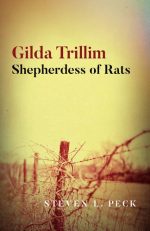 are courageous enough to read the works of Steven Peck must surrender their explanations, abandon their rational pretenses, and jettison their surety in their senses. They must keep reading when genre mixes, characters behave shockingly, and plot is wild and volatile. What they are seeing may only be a glimpse of what Peck has seen and heard and experienced, but that glimpse is enough for most: they will find that what is left is revelatory. Steven Peck’s works expose our stubborn defenses and false dichotomies, our barricades and our battlelines. It is only then, after the collapse of our own constructs, that we begin to encounter reality.
are courageous enough to read the works of Steven Peck must surrender their explanations, abandon their rational pretenses, and jettison their surety in their senses. They must keep reading when genre mixes, characters behave shockingly, and plot is wild and volatile. What they are seeing may only be a glimpse of what Peck has seen and heard and experienced, but that glimpse is enough for most: they will find that what is left is revelatory. Steven Peck’s works expose our stubborn defenses and false dichotomies, our barricades and our battlelines. It is only then, after the collapse of our own constructs, that we begin to encounter reality.
Steven L. Peck’s career
Steven L. Peck, a Utah native from Moab, Utah, is one of the Latter-day Saints’ most creative and respected authors. He is an ecology professor at Brigham Young University and, in that capacity, has published over fifty scientific articles in the fields of insect evolutionary ecology, ecological mathematics, and philosophy of biology. As a 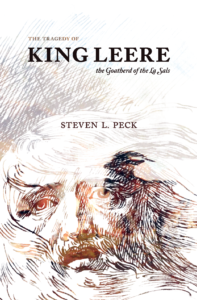 writer, his work draws on the rhizomatic connections between his love of the land and its ecology. His fiction explores relationships with science, religion, evolution, consciousness, and the ways humans interact with the other inhabitants of this planet.
writer, his work draws on the rhizomatic connections between his love of the land and its ecology. His fiction explores relationships with science, religion, evolution, consciousness, and the ways humans interact with the other inhabitants of this planet.
His most recent novel, The Tragedy of King Leere, Goatherd of the La Sals (BCC Press, 2019), is a dystopian retelling of King Leer, set in the La Sal mountains of Southeastern Utah near Moab, and offers a meditation on ecology, land, place, and the madness of unchecked greed. It was a semi-finalist for the Big Moose Prize sponsored by Black Lawrence Press,received a starred review from Publishers Weekly, and was short-listed for the Grand Prize in the Eric Hoffer Book Awards for works published by small, independent, and academic presses.
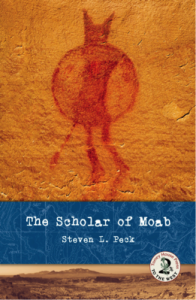 His first book, the short novel A Short Stay in Hell (2009, republished by Strange Violins, 2012), is a funny, tragic tale of a man stuck in a hell he could not have imagined before he died, an infinite library (based on Borges’ “The Library of Babel”) where he is supposed to find the book that tells the story of his life. It remains his most popular book.
His first book, the short novel A Short Stay in Hell (2009, republished by Strange Violins, 2012), is a funny, tragic tale of a man stuck in a hell he could not have imagined before he died, an infinite library (based on Borges’ “The Library of Babel”) where he is supposed to find the book that tells the story of his life. It remains his most popular book.
Peck is a two-time winner of the Association of Mormon Letters Novel Award. First for The Scholar of Moab (Torrey House, 2011), a darkly comic work of magical realism, set in Moab and Vienna, Austria, that flits among ranching, academics, and theories of mind. Second, Gilda Trillim: Shepherdess of Rats (Roundfire Books, 2017), about a woman’smany adventures; from her origins on a potato farm in Idaho, to an Orthodox Convent in the Soviet Union, to her life as a badminton champion. When Gilda is taken prisoner during the Vietnam war, she finds comfort in the company of the rats who cohabit her cell. Gilda Trillim is one of the most remarkable novels produced from the Mormon tradition, exploring“themes of grace, love, sacrifice as well as universal questions about the mind and body, free will, and how anything is known–including and the reality and nature of god . . . It is a milestone not just for its message but for its medium, harnessing the form of the novel to show that imagination can bring us closer to truth.” (AML Award citation).
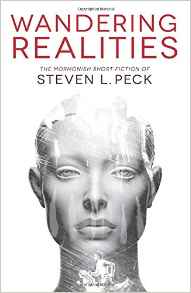 His first book of short stories, Wandering Realities (Zarahemla, 2015) was a finalist for the AML award, and contains his AML award-winning short story, “Two-dog dose”. He self-published a second collection Tales from Pleasant Grove, in 2018. He has had two collections of poetry published, Fly Fishing in Middle Earth (2008) and Incorrect Astronomy (Aldrich, 2013), and his poetry has appeared in New Myths,
His first book of short stories, Wandering Realities (Zarahemla, 2015) was a finalist for the AML award, and contains his AML award-winning short story, “Two-dog dose”. He self-published a second collection Tales from Pleasant Grove, in 2018. He has had two collections of poetry published, Fly Fishing in Middle Earth (2008) and Incorrect Astronomy (Aldrich, 2013), and his poetry has appeared in New Myths, 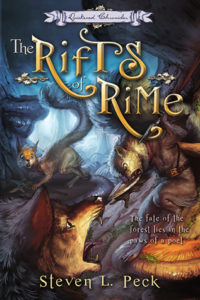 Pedestal Magazine, Prairie Schooner, Red Rock Review, and other places. He is also the author of The Rifts of Rime (Cedar Fort, 2012), a young adult fantasy featuring anthropomorphic animals. Michael Austin has said it can be compared to “a cross of Watership Down with The Rise and Fall of the Third Reich, with a generous helping of Jonathan Livingston Seagull”.
Pedestal Magazine, Prairie Schooner, Red Rock Review, and other places. He is also the author of The Rifts of Rime (Cedar Fort, 2012), a young adult fantasy featuring anthropomorphic animals. Michael Austin has said it can be compared to “a cross of Watership Down with The Rise and Fall of the Third Reich, with a generous helping of Jonathan Livingston Seagull”.
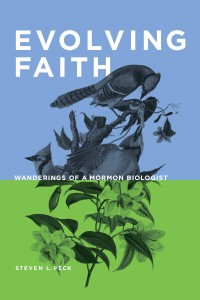 He has published two books exploring science and religion. Evolving Faith (Maxwell Institute, 2015) and Science the Key to Theology (BCC Press, 2017). He tells the story of the bacterial infection that severely impacted his consciousness in the essay “My Madness” (Dialogue, 2002). The story gained national recognition when an audio version was produced by the Believable Podcast, and played on the NPR Rough Translation show. 2019 Peck joined the Maxwell Institute as a Research Fellow to study the relationship between faith and science.
He has published two books exploring science and religion. Evolving Faith (Maxwell Institute, 2015) and Science the Key to Theology (BCC Press, 2017). He tells the story of the bacterial infection that severely impacted his consciousness in the essay “My Madness” (Dialogue, 2002). The story gained national recognition when an audio version was produced by the Believable Podcast, and played on the NPR Rough Translation show. 2019 Peck joined the Maxwell Institute as a Research Fellow to study the relationship between faith and science.
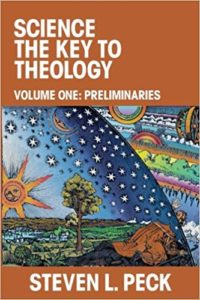 His most recent published literary work is the short story “The Angels of Pleasant Grove”, part of the BYU Library project “A Desolating Sickness: Stories of Pandemic”.
His most recent published literary work is the short story “The Angels of Pleasant Grove”, part of the BYU Library project “A Desolating Sickness: Stories of Pandemic”.
AML President James Goldberg has recently written, “In fiction, Steven L. Peck felt like the voice of the decade. His use of surreal imagery to get at serious questions is one mark of what my brother Mattathias calls ‘Peculiar Fiction.’ Peck leans in to conflicting voices and evidence, highling the limits and distortions our own reality-processing introduces into any efforts to know what’s going on, and still finds moments of transcendence in the slightest things. A Short Stay in Hell left me intellectually haunted and laid a groundwork for me to appreciate Peck’s view of evolution. The scenes where we see things stripped down to a single function through a battle robot’s mind in The Tragedy of King Leere will stick with me for a long time, especially paired with the frame questions about what it means to love the land. Steven Peck was prolific this past decade and he gave us new ways of seeing, grounded in the southern Utah landscape he came from and the faith intertwined with his heart and history.”
Steve lives in Pleasant Grove, Utah with his wife, Lori Peck. They have five children.
(Parts of this biography were based on an bio prepared by Mapping Literary Utah)
